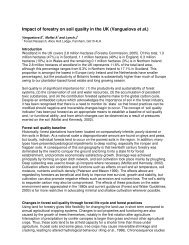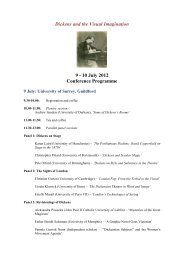The targeted killing of terrorists on foreign soil - Institute of Advanced ...
The targeted killing of terrorists on foreign soil - Institute of Advanced ...
The targeted killing of terrorists on foreign soil - Institute of Advanced ...
You also want an ePaper? Increase the reach of your titles
YUMPU automatically turns print PDFs into web optimized ePapers that Google loves.
Tobias Ruettersh<str<strong>on</strong>g>of</str<strong>on</strong>g>f<br />
Panel 4 (a)<br />
or able to take the measures itself and if the operati<strong>on</strong> is solely c<strong>on</strong>fined to effective counterterrorism<br />
operati<strong>on</strong>s and against terrorist facilities (see Schmitz-Elvenich 2007, 121).<br />
In the literature, there are different interpretati<strong>on</strong>s about the meaning <str<strong>on</strong>g>of</str<strong>on</strong>g> “an attack occurs”.<br />
Some academics take a narrow view and state that Article 51 is superseding customary<br />
internati<strong>on</strong>al law and therefore limits forcible self-defence to cases where the UN Security<br />
Council has not already made a resp<strong>on</strong>se. Thus, the right to self-defence can <strong>on</strong>ly be invoked<br />
after the attack has already started (see Krajewski 2005, 7). Moreover, it is <strong>on</strong>ly a temporary<br />
right until the Security Council has taken acti<strong>on</strong> (see Gray 2008, 124 f.). It is comm<strong>on</strong> ground<br />
that states are allowed to self-defence against attacks which are already taking place. But, other<br />
scholars take a wider view <strong>on</strong> this issue by emphasising the c<strong>on</strong>cept <str<strong>on</strong>g>of</str<strong>on</strong>g> “inherent right” in<br />
Article 51. <str<strong>on</strong>g>The</str<strong>on</strong>g>y state that pre-charter, customary rules <str<strong>on</strong>g>of</str<strong>on</strong>g> self-defence remain in place as the<br />
Charter does not take away those rights without express provisi<strong>on</strong>, and they menti<strong>on</strong> that at the<br />
time <str<strong>on</strong>g>of</str<strong>on</strong>g> the promulgati<strong>on</strong> <str<strong>on</strong>g>of</str<strong>on</strong>g> the Charter there was a wider customary right <str<strong>on</strong>g>of</str<strong>on</strong>g> self-defence,<br />
including the protecti<strong>on</strong> <str<strong>on</strong>g>of</str<strong>on</strong>g> citizens and anticipatory self-defence (ibid., 117 f.). This view was<br />
basically corroborated by the ICJ in the Nicaragua case, as it acknowledged that a customary<br />
right <str<strong>on</strong>g>of</str<strong>on</strong>g> self-defence exists al<strong>on</strong>gside with Article 51 (see Dinstein 2005, 181 f.). However, the<br />
ICJ neither stated whether the customary right was wider than the Charter nor if self-defence<br />
against imminent threats is legal, as the parties did not raise that issue (see Krajewski 2005, 8).<br />
For a wide interpretati<strong>on</strong> <str<strong>on</strong>g>of</str<strong>on</strong>g> anticipatory self-defence, advocators <str<strong>on</strong>g>of</str<strong>on</strong>g>ten refer to the Caroline<br />
incident. In 1837, British troops destroyed the American steamboat Caroline <strong>on</strong> the Niagara<br />
River in US territory, because it was used to transport soldiers and ammuniti<strong>on</strong> into British<br />
Canada to support an emerging Canadian rebelli<strong>on</strong> against Britain. After the US Government<br />
protested, the British claimed their right <str<strong>on</strong>g>of</str<strong>on</strong>g> self-defence for the attack (ibid., 9 f.). Hereup<strong>on</strong>,<br />
the US Secretary <str<strong>on</strong>g>of</str<strong>on</strong>g> State, Daniel Webster, made clear that the exercise <str<strong>on</strong>g>of</str<strong>on</strong>g> self-defence as an<br />
inherent and aut<strong>on</strong>omous right requires the dem<strong>on</strong>strati<strong>on</strong> <str<strong>on</strong>g>of</str<strong>on</strong>g> the “necessity <str<strong>on</strong>g>of</str<strong>on</strong>g> self-defence,<br />
instant, overwhelming, leaving no choice <str<strong>on</strong>g>of</str<strong>on</strong>g> means and no moment for deliberati<strong>on</strong>” (Webster<br />
1842). This definiti<strong>on</strong> was accepted by the British government and later became a standard <str<strong>on</strong>g>of</str<strong>on</strong>g><br />
customary internati<strong>on</strong>al law. However, it is highly debatable, whether standards developed in<br />
the 19 th century, with a completely different noti<strong>on</strong> <str<strong>on</strong>g>of</str<strong>on</strong>g> war as a political tool, can still be seen<br />
as adequate criteria for the exercise <str<strong>on</strong>g>of</str<strong>on</strong>g> self-defence in the 21 st century (see Krajewski 2005, 10;<br />
Brownlie 2003, 701 f.). But internati<strong>on</strong>al practice is clear: States do claim a right to use force<br />
in an anticipatory way when the Websterian c<strong>on</strong>diti<strong>on</strong>s are met (Kegley/Raym<strong>on</strong>d 2003, 387).<br />
- 12 -
















